TODAY’S READING FROM THE OLD TESTAMENT- EZEKIEL 21:1-22:31.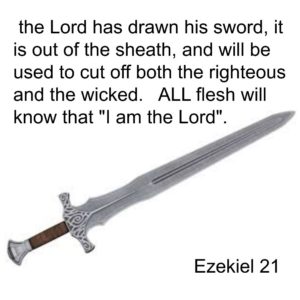
This prophetic message, “The Song of the Sword”, begins with a prelude in the previous chapter.
Ezekiel 20:45-46 45 And the word of the LORD came to me: 46 “Son of man, set your face toward the southland; preach against the south, and prophesy against the forest land in the Negeb.
The Name of the Lord had been blasphemed by His own people by their idolatrous behavior and the time of judgment has come.
The central theme of this prophetic message is found in Ezekiel 21:8-17, with the image of God’s hand using all things as His sharpened, gleaming sword, as He executes His purposes upon the earth. He works all things according to the counsel of His will (Ephesians 1:11).
The image of “the sword of the Lord” is a sobering one.
Ezekiel 21:8-11 8 And the word of the LORD came to me: 9 “Son of man, prophesy and say, Thus says the Lord, say: “A sword, a sword is sharpened and also polished, 10 sharpened for slaughter, polished to flash like lightning!
Judgment for sin is a prerequisite to blessing. These judgments also pre-figure the future time when God will purge the earth (Revelation 17-18) in preparation for the rule of the Messiah (Revelation 19-20).
The picture of the sword being drawn speaks of God being ready to manifest His justice. “It is coming. It will surely take place!”
An interesting observation from the New American Commentary on Ezekiel, by Lamar Cooper, Sr.
“The phrase, “Son of man, set your face against” occurs nine times in the Bible, all in Ezekiel. Each time the phrase is in the context of judgment. Here Ezekiel is commanded to prophesy judgment against Jerusalem. There is a New Testament parallel to the text. In Luke 9:51 the Son of Man, Jesus, “set his face to go to Jerusalem.” Once in Jerusalem, Jesus prophesied the judgment that would come upon the city with its destruction by the Romans in 70 A.D. (Luke 19:41-44; 21:20-24).
Luke 21:20-24 20 “But when you see Jerusalem surrounded by armies, then know that its desolation has come near. 21 Then let those who are in Judea flee to the mountains, and let those who are inside the city depart, and let not those who are out in the country enter it, 22 for these are days of vengeance, to fulfill all that is written. 23 Alas for women who are pregnant and for those who are nursing infants in those days! For there will be great distress upon the earth and wrath against this people. 24 They will fall by the edge of the sword and be led captive among all nations, and Jerusalem will be trampled underfoot by the Gentiles, until the times of the Gentiles are fulfilled.
Sometimes the righteous do suffer because of the sins of the wicked, as we have seen in the history of the spiritual decline of both the northern and southern kingdoms. ‘The sword’ may cut off from you both the righteous and the wicked (21:3).
Ezekiel is given further direction to dramatically portray the horror of impending judgement by crying out and wailing, while beating his chest as a sign of grief (21:13). He was to strike his hands together twice, as a sign of anger, and let the sword strike three times (21:14) referring probably to Nebuchadnezzar’s three attacks against Jerusalem. The first attack was in 605 BC (during the reign of Jehoiakim), the second in 597 BC (during the reign of Jehoiachin), and the third from 588-586 BC (during the reign of Zedekiah). The third attack would culminate with the destruction of the temple.
The Lord Himself will strike His hands together in determination to execute judgement until His fury is spent.
He puts the sword back in its sheath only when judgment is complete, or if He decides to mercifully spare people.
The application for us here is to recognize that judgment awaits those who refuse to heed His warnings and calls to repentance. All have sinned and fall short of the glory of God (Romans 3:23). The wages of sin is death (Romans 6:23a). The soul that sins will die (Ezekiel 18:4).
The good news is that we can be saved from the wrath of God by turning away from our sinful service to the idol of SELF and then trust Jesus Christ as our Lord and Savior. “The free gift of God is eternal life in Christ Jesus, our Lord” (Romans 6:23b).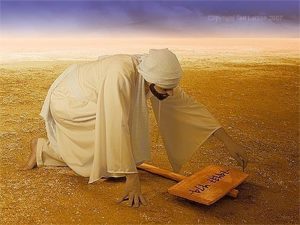
Ezekiel is given more directions to stage a prophetic message. The King of Babylon is seen as having to make a decision. He stands at a crossroads. Ezekiel would draw a picture, a scenic backdrop to indicate this. Ezekiel is to make a signpost indicating a road permitting Nebuchadnezzar to attack the Ammonites, and another indicating a road permitting him to attack Jerusalem. He will endeavor to decide which road to take by various means of divination: the casting of lots with arrows, consulting idols and examining the liver. But God is in control and ensures that Nebuchadnezzar takes the road to execute siege warfare upon Jerusalem.
God also decrees that the Ammonites return their sword to the scabbard. What does this indicate?
God is overseeing the activities of all nations. Kingdoms will rise and fall until the crown comes to Whom it belongs (Ezekiel 21:27; Genesis 49:10; The Messiah; Shiloh- ‘He whose it is”).
The Ammonites, descendants of an immoral encounter of the daughters of Lot with their drunken father, were known for idolatry (1 Kings 11:7, 33), cruelty (Amos 1:13) and pride (Zephaniah 2:9-10), and were enemies of God’s people (Deuteronomy 23:3-4; Judges 3:13; 1 Samuel 11:1-3; 2 Samuel 10:1-4; 2 Kings 24:2; Nehemiah 4:3,7-8). Although they participated in God’s judgment of Jerusalem, they would be an object of wrath and remembered no more.
This is what the Lord says about the world system in rebellion against Him.
Ezekiel 21:27 27 A ruin, ruin, ruin I will make it. This also shall not be, until he comes, the one to whom judgment belongs, and I will give it to him.
Ezekiel Chapter 22 reminds us of the need for a wall of righteousness to stand in the gap to protect the city of Jerusalem. But there was no priest, prophet, or people who could hold back God’s righteous indignation.
In verses 1 through 5, God declares that He knows their sins and therefore will make His people an object of scorn (22:4).
Israel has become ‘dross’ to the Lord (22:18). The impurities of the nation have risen to the top of the molten metal and is to be skimmed off and thrown away. The corruption of the officials, the princes, priests, prophets and people are listed (22:23-29).
One can see the parallel between today’s society and the one described here as ‘dross’ and fit for judgment. Members of government appointed to uphold the pursuit of life and the well-being of its citizens, legalize abortion, promote what is known to be high-risk destructive practices, and policies that undermine the fabric of society. Greed and selfishness undermine any equitable exchange in the free market for trade. A democratic republic is threatened by mob rule. Social division is accelerated by false narratives such as critical race theory and identity politics. Those who can shout the loudest, drown out the cries of those who cannot be heard above the din, such as the poor, oppressed and unborn. The teachers, like the priests of Old, appointed to ‘educate’ (lead people out of ignorance) withhold sacred valid information and promote unholy agendas. Ezekiel compares the government officials to ‘wolves’ attacking and tearing their prey. The prophets, who were to function as the moral and spiritual conscience of the nation, instead of preaching against sin and the reality of judgment, give a whitewashed picture of life as you want it, tickling the ear of the self-indulgent consumer.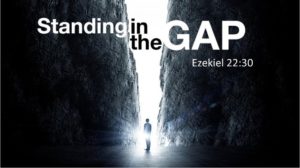
God has sought for a solitary individual to stand in the gap. Who will stand in the breaches in the wall of righteousness and make a difference by calling nations and individuals to repentance? Abraham interceded for Sodom. Noah, Moses, Deborah, and Daniel also stood in the gap in their generations, pleading for God’s mercy so that He would not destroy the people.
Because no one could stand in the gap, God would have to pour out his wrath upon His beloved Jerusalem.
Aren’t you grateful that Jesus stood in the gap for you?
TODAY’S READING FROM THE NEW TESTAMENT – HEBREWS 10:1-17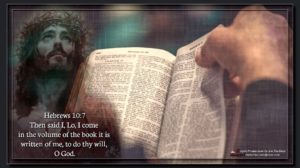
The sacrifices offered in the temple worship were a reminder of sins. Jesus sitting at the right hand of the Majesty on High is a reminder of what God has done to put away sin.
Jesus perfectly finished the work of redemption on behalf of those who would believe on Him. He came to do the will of the Father, to save His people from their sins. His mission is inscribed on all the pages of Scripture.
It is wonderful to be clued in to what Jesus said as He stepped out of eternity into time to take upon Himself the sinless humanity of a babe in the womb:
Hebrews 10:5-7 5 Consequently, when Christ came into the world, he said, “Sacrifices and offerings you have not desired, but a body have you prepared for me; 6 in burnt offerings and sin offerings you have taken no pleasure. 7 Then I said, ‘Behold, I have come to do your will, O God, as it is written of me in the scroll of the book.’”
The writer of Hebrews explained that Jesus had to be born under the law to fulfill the Law (the Old ‘Mosaic’ covenant). He did that to establish the New Covenant. The blood that was shed to provide full atonement for our sins, ratified and inaugurated the New Covenant. Now all who believe can enter into this covenant as joint beneficiaries.
We can experience the benefits of the indwelling presence of the Lord, where the Law-Giver becomes the Law-Keeper in our hearts. And we can know that our sins and iniquities are remembered no more.
This priest paid our sin debt in full on the cross, crying ‘It is finished’ (John 19:30). The shed blood of the sinless Lamb of God, the evidence of His poured out life, satisfies God’s impeccable sense of justice, and makes possible what was promised in the New Covenant spoken about by the prophet Jeremiah- that “our sins and iniquities God will remember no more”.
There is a change of house rules. The old house rules of the ceremonial law are put away. The Lord sets aside the first set of rules (Hebrews 10:9) to establish the second. We don’t need to go find an innocent animal to bring to the temple priest and have him sacrifice it to atone for our sins. We don’t need the priest to wash for us, to confess sins for us, to go into the holy place for us, and to pray for us at the altar of incense. Jesus is our intercessor. He is our mediator. He is the Bread on the table, the Light of the Candlestick (Lampstand) and He is the One who intercedes for us to the delight of the Father (the altar of incense). He not only entered into the holiest of all as our representative, but He is the Holiest of All. His blood secures for us eternal redemption.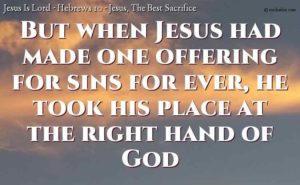
After completing His work on the cross, we have this anthropomorphic expression, that Jesus ‘sat down at the right hand of God’. This means that, just as God rested on the seventh day with total satisfaction that the work of creation had been completed, God rests in the fact that the work of redemption has been completed.
Genesis 2:2 2 By the seventh day God completed His work which He had done, and He rested on the seventh day from all His work which He had done.
Jesus completed the work of redemption, totally satisfying His own demands of righteousness, and sat down with an eternal rest. He is the Sabbath.
Therefore, there is a change in the house rules regarding keeping the Sabbath. Now the Sabbath keeps us.
We enter into His rest.
Hebrews 10:10 10 By this will we have been sanctified through the offering of the body of Jesus Christ once for all.
TODAY’S READING FROM THE BOOK OF PSALMS- PSALM 108:1-13
This is a wonderful song to sing by faith. It sets our heart in the right direction when we sing it. It awakens our soul at the day’s dawn. (Perhaps there is a hidden reference to hastening the Lord’s return: ‘I awaken the dawn’.)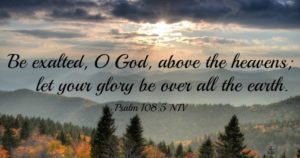
Is your prayer that the Lord be exalted today? We are citizens of the Dawn, the coming Kingdom.
We need His help to fulfill our ambassadorship. We need to be delivered from all the delusions and distractions of this age. Let us pray:
Psalm 108:6 6 That Your beloved may be delivered, Save with Your right hand, and answer me!
There is a need for us to be refreshed in the cycle of repentance if we are to walk in the Spirit and experience victory over our enemies.
The Psalm closes with these words of hope
Psalm 108:13 13 Through God we will do valiantly, and it is He who shall tread down our adversaries.
TODAY’S READING FROM THE BOOK OF PROVERBS – PROVERBS 27:12
Proverbs 27:12 12 A prudent man sees evil and hides himself, the naive proceed and pay the penalty.
We pay the price for our ignorance. It is wise to take precaution when we see the works of the tempter and recognize his evil schemes.
This causes us to understand the Apostle Paul’s earnest plea: “I would not have you ignorant” (Romans 1:13; 1 Corinthians 12:1; 1 Thessalonians 4:13).
Ephesians 5:17 17 So then do not be foolish, but understand what the will of the Lord is.
PRAY FOR THE NATIONS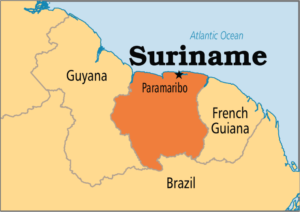
Suriname
Republic of Suriname
Latin America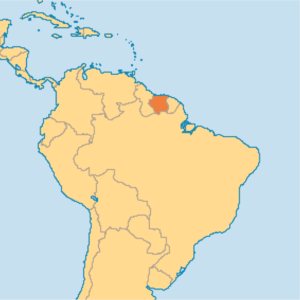
Geography
Area: 163,820 sq. km
Northeast coast of South America, between Guyana and French Guiana.
Population: 524,345 Annual Growth: 0.97%
Capital: Paramaribo
Urbanites: 75.6%
HDI Rank: 97 of 182 (UN Human Development Reports 2009)
Peoples
Peoples: 26 (4% unreached) All peoples
Unreached Peoples Prayer Card
Official language: Dutch. Trade language Sranan Tongo (a Dutch Creole) Languages: 20 All languages
Religion
Largest Religion: Christian
|
Religion |
|
Pop % |
Ann Gr |
|
259,918 |
49.57 |
1.0 |
|
|
72,235 |
13.8 |
6.3 |
Challenges for Prayer
Less-reached peoples. Pray for these:
- a) The Javanese are predominantly Muslim, but nominally so. New generations of Javanese Christians, across denominations, rise to the challenge of reaching their own people. CMA and IMB now facilitate church planting training and mobilize churches to reach the Javanese. The Suriname Javanese NT was published in 2000, and plans are underway to translate the OT.
- b) The Indian community is only now beginning to respond to the gospel. WT, in partnership with SKS (a Hindustani organization), seeks to see a church within walking distance of every Hindustani. But local congregations are slow on the uptake regarding outreach to this long-neglected group; pray for this partnership to spark greater zeal for ministry among them. Currently, there is no work or witness among Muslims within the Hindustani. Pray that the barriers of prejudice and misunderstanding be removed and the spiritual powers preventing their evangelization be rendered helpless.
- c) Chinese churches are growing and actively joining other local churches and missions to plant more churches among Chinese in the region. CMA and the Moravians are involved in this outreach to the Chinese, who come mostly from the southern coastal provinces of China.
PRAYER: Lord, we are grateful that in Your wrath, You remembered mercy. We thank You for the work of our Great High Priest. By His perfect offering on our behalf, we stand before You clothed in His righteousness. We come before You with boldness, knowing that by Your grace, we have legal claim as joint heirs to all that is His. Help us to walk worthy of this high calling and privilege to be called Your children. In Jesus’ Name. Amen.
